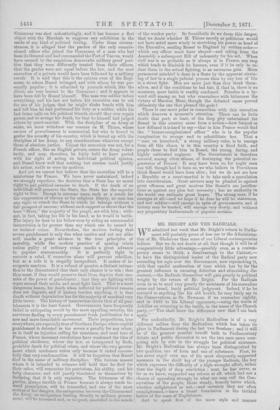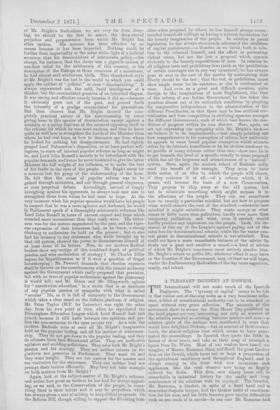MR. BRIGHT AND THE RADICALS.
'SATE admitted last week that Mr. Bright's return to Parlia- ment will probably prove of less use to the Administra- tion of Mr. Gladstone than some of our Liberal contemporaries believe. But we do not doubt at all, that though it will be of comparatively little advantage,—possibly even, as a contem- porary seems to think, a disadvantage to the Cabinet,— to have the distinguished leader of the Radical party now extending his aegis over the Government, now reproaching it, with that candid moderation of tone which has by far the greatest influence in excusing defection and stimulating dis- content,—the Radicals themselves will gain greatly in political weight by the return of Mr. Bright. For the Radicals seem to us to need very greatly the assistance of his masculine sense and. broad, burly political judgment. Indeed, if he be restored to anything like his old health, he may fairly say to the Conservatives, as Dr. Newman, if we remember rightly, said in 1833 to his Liberal opponents,—using the words of Achilles on returning to the battle, in the name of the Church party,—" You shall know the difference now that I am back again."
For undoubtedly, Mr. Bright's Radicalism is of a very different calibre from the Radicalism which has taken its place in Parliament during the last two Sessions ; and it will be of the greatest possible benefit both to Parliamentary debate and public discussion to see the two once more com- peting side by side in the struggle for political existence. Mr. Bright's Radicalism has always been distinguished by two qualities, one of form and one of substance. First, he has never urged oven one of his most eloquently supported measures in the shrill key of the younger Radicals, the key which expresses the difficulty of a high-wrought effort, rather than the depth of deep conviction ; next, he has never, as far as we know, supported any reform at all which had not a chance of appealing strongly to what one may call the Con- Bei vatism of the people, those steady, homely tastes which, whether enlightened or not,—and certainly they are 'often unenlightened,—have a broad foundation in the faithful habits of the mass of Englishmen.
And to speak first of the more style and manner
of Mr. Bright's Radicalism, we are very far from deny- ing, we should be the first to assert, the deep-rooted prejudice and prepossession from which Mr. Bright has often spoken. His manner has been effective by no means because it has been impartial. Nothing could be further from impartiality or the sober white light of a judicial accuracy, than his denunciations of aristocratic policy,—his charge, for instance, that the Army was a gigantic system of out-door relief for the aristocracy of this country, or his description of the Bishops as those creatures of a monstrous, he had almost said adulterous, birth. This thunderbolt style of Mr. Bright's was the last in the world to which you could apply the epithet of " judicial" or even "discriminating." It always represented not the cold, lucid intelligence of a thinker, but the accumulated passions of an inherited disgust. It was strong and effective exactly because it did so,—because it obviously grew out of the past, and poured forth the intensity of a grudge accumulated for generations. But then observe that Mr. Bright showed the com- pletely practical nature of his statesmanship by never giving loose to this species of denunciation except against a ministry or a policy that was at the moment opposing itself to the reforms for which he was most anxious, and that he knew quite as well how to strengthen the hands of the Minister from whom he had real hope, as how to denounce one from whom he looked for nothing but disappointment. He had rightly gauged Lord Palmerston's disposition, or at least perfect will- ingness, to stave off internal popular reforms as long as might be, and Lord John Russell's anxiety to be beforehand with the popular demands, and hence he never hesitated to give the latter Minister the full weight of his influence, or to make the best of his faults in the eyes of the people. Mr. Bright never for a moment lost his grasp of the statesmanship of the hour. He felt that the cause of popular reform was to be gained through ministries, and not through general eloquence, or even perpetual debate, Accordingly, instead of simply inveighing against his opponents, he always took care also to strengthen those from whom he had most to hope. At the very moment when his popular speeches would have led people to suspect that he was a mere agitator and firebrand, he would in Parliament speak of a thoroughly aristocratic reformer like Lord John Russell in, tones of earnest respect and hope which sounded more inconsistent than they really were. Hie bitter- ness was for the system engendered by the past, and the vigor- ous expression of that bitterness had, as he knew, a strong tOndency to undermine its hold on the present ; but so also had his leniency to any statesman who, while brought up in that old system, showed the power to disembarrass himself of at least some of its fetters. Now, do our modern Radical leaders show any vestige of this combined depth of political passion and wise moderation of strategy ? Sir Charles Dilke argues for Republicanism as if it were a question of frugal housekeeping ; Mr. Fawcett demands that election expenses shall be thrown on the constituencies with the utmost acrimony against the Government which really proposed that provision, but with no force of popular enthusiasm against the plutocracy it would kill; and Mr. Dixon and Mr. Illingvvorth agitate for " unsectarian education," in a strain that is as destitute of any popular passion of sympathy with what is called " secular " life, as it is full of animosity to the Government which takes a clear stand on the definite platform of religion. Mr. Peter Taylor (M.P. for Leicester) was right the other day, from his own point of view, when he repudiated the Birmingham Education League which Lord Russell had just joined, because it still halts between two opinions, and pre- fers the non-sectarian to the open secular cry. As a rule, the modern Radicals miss at once all Mr. Bright's imaginative hold on the popular feeling, and all his instinct of statesman- ship. They do not get down to the popular feeling, and they do alienate their best Ministerial allies. They are ineffective agitators and scolding politicians. They miss both Mr. Bright's passion and his strategy. They are neither intense on the platform nor generous in Parliament. They want via and they want insight. They are too narrow for the masses and too vindictive for the statesmen. They can neither lead nor prompt their leaders efficiently. May they not take example on both matters from Mr. Bright ?
Again, look at the subject-matter of Mr, Bright's reforms, and notice how great an instinct he has had for always appeal- ing, as we said, to the Conservatism of the people, to some- thing fixed in their habits and it may be prejudices, which has always given a sort of solidity to his political proposals. On the Reform Bill, though willing to support the £6 rating fran- chise when proposed by others, he has himself always recom- mended household suffrage as having a natural fascination for the homely imagination of the people. In relation to penal legislation, he has always strenuously advocated the abolition of capital punishment,—a blunder, as we think, both in rela- tion to the criminal himself, and the effect in preventing violent crime, but not the less a proposal which appeals obviously to the homely superstitions of men. In relation to. all religious tests and prohibitory laws (such as the prohibition of certain marriages not in any way unnatural), he has always gone at once to the root of the matter by maintaining that liberty should be the law ; that the test, or prohibition, must. show ample cause for its existence, or else is condemned at once. And even on a groat and difficult question, quite foreign to the imaginations of most Englishmen, like that of the reform of our Indian Government, he has taken the question almost out of its outlandish conditions by pleading for comparative independence in the administration of the different Presidencies, BO that there may be less artificial cen- tralization and freer competition in civilizing agencies amongst the different Governments, each of which best knows the con- ditions of progress within its own district. Here, again, we. are not expressing our sympathy with Mr. Bright's view,— we believe it to be impracticable,—but simply pointing out. how comprehensive is his conception of reform, how uniformly he appeals to some broad popular conception which attracts. either by its intrinsic homeliness or by its obvious tendency to be prolific of many reforms rather than one,—how sure he is to get beneath the level of a specific remedy to some proposal which has all the largeness and attractiveness of a natural ' system. Here, again, the modern school of Radicals sadly need the benefit of his example. They seem to have- little notion of an idea to which the people will cleave, if they embrace it at all,—of a reform which, if it passes, will become the basis of a neiv Conservatism. They propose to chip away at the old system, but not to substitute something which might surpass it int the affections of the people. They can see sometimes how to remedy a particular mischief, but not how to propose what would remove the root of the mischief, —whatever new- mischief it might substitute. They waste energy on what comes to little more than palliatives, hardly even more than temporary palliatives, and what, even if carried, would hardly produce any impression on the people. Look, for in- stance, at this cry of the League's against paying out of the- rates fees for denominational schools, while the far vaster cen- tral grant to denominational schools is not attacked. Yon could not have a more remarkable instance of the advice to strain out a gnat and swallow a camel,—a kind of advice of which Mr. Bright's conscience must entirely absolve him. Mr. Bright's return to public life, whatever effect it may have on the duration of the Government, may, at least we will hope, render the Parliamentary Radicalism of the day more sagacioas,. manly, and robust.



































 Previous page
Previous page